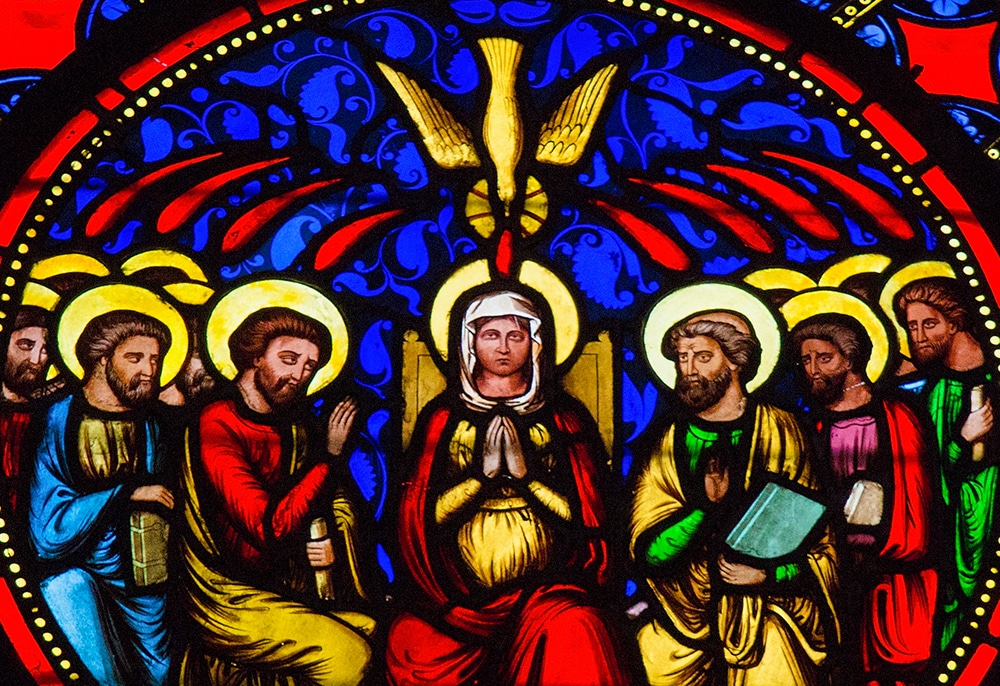
But, we may see this grace as functionally a helpful assistant — the iPhone’s Siri to our otherwise independent religious practice. Let me try hard to pray, and if it gets difficult, Veni Sancte Spiritus.
There is a haunting line in the sequence for Pentecost that should make all of us rethink our supposed natural capacity to advance in holiness. A sequence is a poetic composition that comes immediately before the Alleluia. These sequences were popular in the Middle Ages, functioning as musical meditations on the feasts of the liturgical year. After the Council of Trent in the 16th century, the Church kept but five of these sequences in the liturgy. One is the Come Holy Spirit for the feast of Pentecost.
| May 31 – Pentecost Sunday |
|---|
|
Acts 2:1-11
Ps 104:1, 24, 29-30, 31, 34
1 Cor 12:3-7, 12-13
Jn 20:19-23
|
In the fifth and sixth stanzas of the Pentecost sequence, the Church sings: “O lux beatissima, / reple cordis intima / tuorum fidelium / Sine tuo numine, / nihil est in homine, / nihil est innoxium.” A literal English translation reads, “O most blessed Light, restore the innermost place of the hearts / of your faithful / Without your divine power, / nothing is in man, / nothing is harmless.”
Nihil. Nothing.
The extended Vigil for Pentecost narrates the nothingness of the human condition. In Genesis, our forebears tried to build a tower reaching into the heavens, to make a name for ourselves. We would build a city that would cause all to bend a knee before its grandeur. Before our grandeur.
God sees this foolish act. The city is not to be built. And men and women are now scattered across the world, unable to speak the same language. Where there was once the possibility of communication among us, there is now only misunderstanding.
Nothing.
In the prophet Ezekiel, we look upon the dustiness of dry bones, the forgotten memory of concrete persons. Death is, after all, the ultimate nothing. Before death, we can speak face to face with our spouse, our children and our friends. After death, this face-to-face communion is no more.
Until we understand the nihil, the nothingness of death, we also cannot grasp the gift of salvation. We can do nothing about death.
On Easter evening in the Gospel of John, the disciples are in the upper room, contemplating the nothingness of the death of Our Lord. Jesus enters this room, breathing upon them the Holy Spirit. With this gift, comes the power to forgive sins.
The power to end the reign of nothingness.
For sin is just that. It’s nothing. Men and women were created for praise, for adoration, for communion with God. We traded divine life in for nothing.
But “nothing” is no more. Through the Holy Spirit, the Christian is now united with God. Sin is revealed as nothing. Death is revealed as nothing. The great lie of power and prestige. Of nothingness.
The end of nothingness is not something that we can accomplish. It is the divine Spirit that heals us, consoles us, brings us into deeper union with Christ, creates the Church as the human race speaking but one language — a song of praise before the living God.
Jesus has ascended to the Father. But, we are not left alone. Christian life is not about going it alone, pulling oneself up by one’s bootstraps.
It is received that Spirit breathed upon us by our Lord. This Spirit heals us of our nothing disease, recreating us into sons and daughters of God.
Without you, O Spirit, nothing is harmless. Nothing can fill us.
Now, that’s something.
Timothy P. O’Malley, Ph.D., is the director of education at the McGrath Institute for Church Life at the University of Notre Dame.





